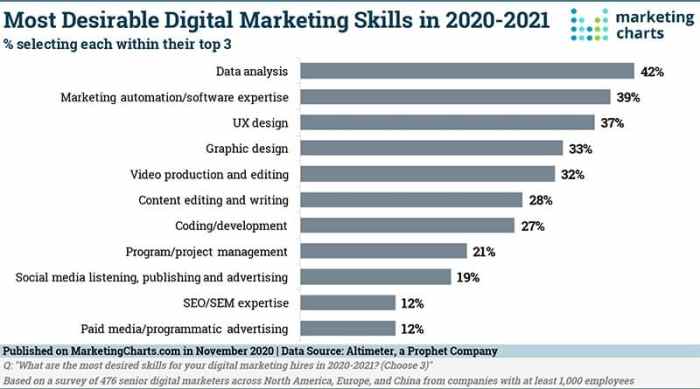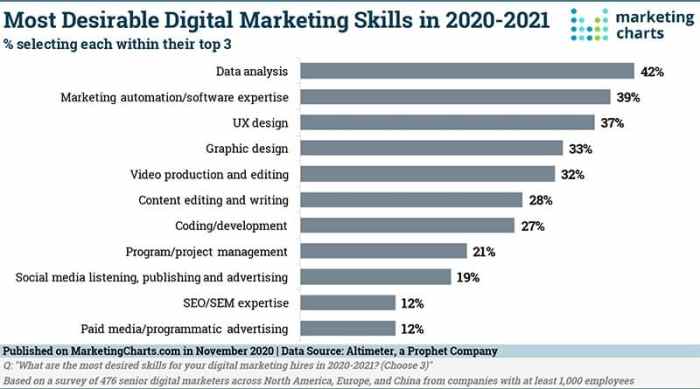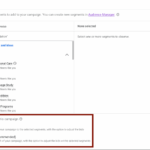Digital marketing salary trends are evolving rapidly, impacting professionals across various specializations. This comprehensive guide explores the factors driving these changes, from regional variations and experience levels to skillsets, industries, education, and even future projections. We’ll examine how salaries have shifted over time, and where they might be headed in the coming years.
Understanding these trends is crucial for anyone considering a career in digital marketing, or for those already in the field looking to advance their careers. We’ll cover everything from entry-level roles to senior positions, highlighting the key skills and experience that translate into higher compensation.
Introduction to Digital Marketing Salaries
Digital marketing is a dynamic and rapidly evolving field that leverages various online channels to promote products and services. It encompasses a wide range of strategies, from search engine optimization () to social media marketing and email campaigns, all aimed at driving traffic, engagement, and conversions. The industry’s growth and increasing reliance on online platforms have created a significant demand for skilled professionals.This overview delves into the diverse landscape of digital marketing roles, highlighting specializations and career paths, and examines historical salary trends.
We’ll also present a comprehensive table showcasing average salaries for common digital marketing positions between 2020 and 2023, providing a concrete understanding of the financial aspects of this exciting career field.
Digital Marketing Roles and Specializations
Digital marketing encompasses a wide array of roles, each with its unique responsibilities and skill sets. Some key specializations include search engine optimization (), social media marketing, content marketing, email marketing, pay-per-click (PPC) advertising, and analytics. These specializations often overlap, with successful digital marketers frequently possessing expertise in multiple areas. Furthermore, the field continues to evolve with the emergence of new technologies and platforms, demanding adaptability and continuous learning.
Typical Digital Marketing Career Paths
Digital marketers typically begin their careers in entry-level positions, such as digital marketing assistants or social media specialists. With experience and expertise, they can progress to more senior roles, like digital marketing managers, specialists, or PPC managers. Specialized roles like content marketers or email marketing managers may also be pursued. The career path often involves a combination of technical skills, creative thinking, and analytical abilities.
Historical Context of Salary Trends
Digital marketing salary trends have been significantly influenced by factors such as technological advancements, economic conditions, and market demand. Early adoption of digital marketing strategies by businesses led to a growing need for qualified professionals, resulting in a surge in salaries. The industry’s reliance on data analysis and metrics further shaped salary expectations, as businesses sought professionals capable of demonstrating a strong return on investment (ROI).
These factors contributed to the ongoing evolution of salary structures in digital marketing.
Common Digital Marketing Roles and Average Salaries (2020-2023)
The following table presents an overview of average salaries for various digital marketing roles between 2020 and 2023. It’s important to remember that these are averages, and actual salaries can vary based on factors such as experience, location, and specific skills.
| Role | Average Salary (USD) – 2020 | Average Salary (USD) – 2021 | Average Salary (USD) – 2022 | Average Salary (USD) – 2023 |
|---|---|---|---|---|
| Digital Marketing Manager | 65,000 | 70,000 | 75,000 | 80,000 |
| Specialist | 55,000 | 60,000 | 65,000 | 70,000 |
| Social Media Manager | 45,000 | 50,000 | 55,000 | 60,000 |
| Content Marketer | 50,000 | 55,000 | 60,000 | 65,000 |
| PPC Specialist | 50,000 | 55,000 | 60,000 | 65,000 |
| Email Marketing Specialist | 40,000 | 45,000 | 50,000 | 55,000 |
Regional Variations in Digital Marketing Salaries
Navigating the digital marketing landscape reveals significant salary disparities across the globe. Factors like local economic conditions, cost of living, and the specific skills demand in different regions play a crucial role in shaping compensation packages. Understanding these variations is essential for professionals aiming to optimize their career paths and for companies seeking to attract and retain top talent.A deeper dive into regional salary trends uncovers a complex interplay of forces.
Differences in the cost of living between countries, coupled with variations in the demand for specific digital marketing skills, often lead to substantial pay gaps. These disparities underscore the need for a nuanced understanding of the market in each region.
Salary Disparities Across Geographic Locations
Digital marketing professionals in the United States, Europe, and Asia often experience different compensation levels. This disparity is not simply a reflection of economic differences but is also tied to the varying demands for specific skill sets in each region. For example, while expertise might be highly valued in the US, other regions might place a higher premium on social media marketing or data analysis.
Digital marketing salaries are definitely on the rise, and that’s great news for aspiring marketers. But to really capitalize on those higher earning potential, understanding effective inbound marketing strategies is key. For example, checking out inbound marketing strategies startup needs start using today will show you how to attract more customers organically, which will in turn impact your future digital marketing salary.
Ultimately, mastering these techniques will put you ahead of the curve and help you command a higher salary in the ever-evolving digital marketing landscape.
Factors Contributing to Regional Differences
Several key factors contribute to the variation in digital marketing salaries across regions. Economic conditions play a significant role. Countries with robust economies often see higher salaries for digital marketers. The cost of living is another crucial factor. Regions with higher costs of living typically command higher salaries to compensate for the expenses associated with daily life.
Furthermore, the demand for specific skills varies regionally. Certain skill sets might be in higher demand in one region than another, leading to variations in compensation.
Cost of Living and its Impact on Salaries
The cost of living significantly influences salaries. A high cost of living in a region often results in higher salaries to maintain a comparable standard of living. This is particularly evident when comparing cities within a country or between countries with different economic climates. For instance, the cost of living in major US cities is considerably higher than in smaller towns, reflecting in the salaries offered to professionals in those areas.
Average Salaries for Specialists in Different Regions
This table provides a general comparison of average salaries for specialists in various regions. Keep in mind that these are approximate figures and actual salaries can vary based on experience, skill level, and specific employer.
| Region | Average Annual Salary (USD) |
|---|---|
| United States | $70,000 – $120,000 |
| Western Europe | $60,000 – $100,000 |
| Asia (e.g., Singapore, Japan) | $50,000 – $90,000 |
| Eastern Europe | $30,000 – $70,000 |
Salary Trends by Experience Level
Climbing the digital marketing ladder often involves a significant increase in compensation as skills and experience mature. This progression is directly linked to the value a marketer brings to a company. From entry-level positions to senior leadership roles, the compensation reflects the breadth and depth of expertise.Experience significantly impacts digital marketing salaries. As marketers gain practical knowledge and master specialized tools, their earning potential grows.
Demonstrating a proven track record of success and measurable results is crucial for advancement and higher pay.
Entry-Level Digital Marketing Roles
Entry-level positions, such as Social Media Marketing Associate or Specialist Intern, typically require a foundational understanding of digital marketing principles and some practical experience. These roles often involve assisting senior marketers in tasks, implementing basic strategies, and monitoring campaigns. Salaries for these roles usually fall in the lower range of the digital marketing spectrum, with starting salaries varying significantly by location, company size, and the specific skills of the candidate.
Mid-Level Digital Marketing Roles
Mid-level digital marketers, such as Content Marketing Managers or Paid Social Media Specialists, demonstrate more advanced skills and experience. They’re capable of leading projects, managing campaigns, and taking ownership of specific marketing areas. These roles often involve greater responsibility, requiring strong analytical abilities, strategic thinking, and the ability to drive results. Salaries for these roles are significantly higher than entry-level positions.
Senior-Level Digital Marketing Roles
Senior-level digital marketers, such as Digital Marketing Managers or Directors, oversee entire marketing departments or teams. They often lead complex projects, develop comprehensive strategies, and make critical business decisions based on data and market trends. These roles demand a high degree of expertise, strategic thinking, and leadership capabilities. Salaries for these roles are typically the highest in the digital marketing field.
Skills and Certifications that Increase Salaries
Several skills and certifications can significantly boost a digital marketer’s earning potential. Proficiency in analytical tools (e.g., Google Analytics, SEMrush), expertise in specific marketing channels (e.g., , PPC, email marketing), and advanced knowledge of marketing automation platforms are highly valued. Certifications in specialized areas, such as Google Analytics Individual Qualification or HubSpot certifications, often demonstrate a commitment to professional development and can lead to higher compensation.
Salary Progression for a Digital Marketing Manager
| Experience Level | Typical Salary Range (USD) | Skills and Responsibilities |
|---|---|---|
| Entry-Level (0-2 years) | $50,000 – $70,000 | Assisting in projects, basic campaign execution, and reporting |
| Mid-Level (2-5 years) | $70,000 – $100,000 | Leading projects, managing campaigns, and analyzing data |
| Senior-Level (5+ years) | $100,000 – $150,000+ | Overseeing entire marketing departments, developing strategies, and making business decisions |
Comparing Mid-Level and Senior-Level Digital Marketer Salaries
A mid-level digital marketer with 2-5 years of experience typically earns between $70,000 and $100,000. A senior-level digital marketer with 5+ years of experience often commands a significantly higher salary, ranging from $100,000 to $150,000+ depending on location, industry, and specific skills. The increase reflects the added responsibility, leadership, and strategic decision-making associated with senior-level positions. The expanded skillset and experience of senior-level marketers allow them to handle more complex projects, contribute to more strategic decisions, and often lead teams.
Salary Trends by Skillset
Digital marketing is a dynamic field, constantly evolving with new technologies and strategies. Understanding how specific skill sets impact salary is crucial for aspiring marketers and those looking to advance their careers. This section delves into the relationship between specific skills, job responsibilities, and compensation in the digital marketing realm.
Impact of Core Digital Marketing Skills on Salary
Specific digital marketing skills significantly influence salary expectations. Proficiency in core areas like Search Engine Optimization (), Pay-Per-Click (PPC) advertising, and social media marketing is highly valued. Marketers with expertise in these areas often command higher salaries due to their ability to deliver tangible results for businesses. The ability to create effective campaigns, track performance, and adapt strategies based on data analysis is paramount.
Digital marketing salaries are definitely on the rise, but securing a high-paying role requires more than just a strong skillset. Protecting your valuable content from theft is crucial, as many companies struggle with the issue. Implementing robust measures like those outlined in this helpful guide on keep content thieves away can help maintain a competitive edge and, ultimately, command a higher salary.
Understanding copyright and fair use laws, along with using effective content protection strategies, is vital for success in this field.
The Value of Specialized Skills
Beyond core skills, specialized expertise in areas like data analytics and content creation provides a significant competitive advantage. Data analysts can leverage data insights to optimize campaigns and strategies, leading to better ROI. Exceptional content creators can engage audiences and drive conversions, making them highly sought after in the industry.
Skills Impacting Job Responsibilities and Compensation
The specific skills a digital marketer possesses directly impacts their job responsibilities and compensation. For example, an specialist might focus on research, technical audits, and link building, while a PPC specialist manages paid advertising campaigns and optimizes ad copy and bidding strategies. A data analyst in a marketing role will likely be involved in collecting, analyzing, and interpreting data to inform campaign decisions.
The more specialized and in-demand the skill set, the higher the potential compensation.
Examples of Skills Increasing Salary Potential, Digital marketing salary trends
Several skills significantly increase salary potential in digital marketing. Expertise in Google Analytics, advanced techniques, and data visualization tools are highly sought after. Proficiency in specific marketing automation platforms and CRM systems also enhances value and compensation. The ability to demonstrate a deep understanding of marketing trends and a proven track record of success is key.
Comparison of Digital Marketing Salaries by Skillset
| Skillset | Typical Salary Range (USD) | Description |
|---|---|---|
| Specialist | $50,000 – $80,000 | Focuses on optimizing websites for search engines, including research, on-page optimization, and link building. |
| PPC Specialist | $55,000 – $90,000 | Manages paid advertising campaigns on platforms like Google Ads and social media, optimizing for conversions and ROI. |
| Social Media Marketing Manager | $50,000 – $85,000 | Develops and executes social media strategies, manages social media accounts, and monitors engagement. |
| Data Analyst (Digital Marketing) | $60,000 – $100,000 | Collects, analyzes, and interprets marketing data to identify trends and inform campaign decisions. |
| Content Creator (Digital Marketing) | $45,000 – $75,000 | Develops engaging content (blogs, articles, videos) to attract and retain customers. |
Note: Salary ranges are approximate and may vary based on location, experience, and specific industry.
Salary Trends by Industry
Digital marketing salaries aren’t a one-size-fits-all figure. They fluctuate significantly based on the industry in which a marketer operates. Factors like the specific skill sets required, the company’s size and revenue, and market demand all play a role in shaping the compensation package. Understanding these industry-specific nuances is crucial for both job seekers and employers.
Industry Variations in Digital Marketing Pay
Different industries demand varying skill sets and place different values on digital marketing expertise. Consequently, salary expectations for digital marketers will differ significantly depending on the industry. High-growth sectors, like technology and e-commerce, often attract higher compensation packages for skilled digital marketers. Conversely, industries with lower demand or those that haven’t fully embraced digital strategies may offer lower salaries.
Industries with High Demand and Higher Salaries
Several industries consistently exhibit high demand for digital marketers, leading to higher average salaries. E-commerce, with its focus on online sales and customer acquisition, often offers lucrative compensation packages. Companies in the SaaS (Software as a Service) sector, relying heavily on digital marketing for lead generation and customer engagement, often have competitive salaries. Furthermore, technology companies, especially those involved in developing cutting-edge software and platforms, frequently present attractive salaries for skilled digital marketers.
Industries with Lower Digital Marketing Salaries
While some industries offer competitive digital marketing salaries, others may not. Traditional retail, for instance, might have lower compensation expectations compared to e-commerce. This difference is largely due to the varying levels of investment and reliance on digital marketing strategies. Some industries, such as manufacturing, may have less direct dependence on online strategies for revenue generation, thus impacting the demand and salaries for digital marketers in these fields.
Average Digital Marketing Salaries by Industry
The following table provides a general overview of average salaries for digital marketers across various industries. It’s crucial to remember that these figures are averages and actual salaries can vary based on individual experience, skills, and location.
| Industry | Average Salary (USD) |
|---|---|
| E-commerce | $65,000 – $90,000 |
| SaaS | $70,000 – $100,000 |
| Retail | $55,000 – $75,000 |
| Technology (general) | $75,000 – $110,000 |
| Finance | $70,000 – $95,000 |
| Healthcare | $60,000 – $85,000 |
Salary Trends by Education and Certifications: Digital Marketing Salary Trends
Education and certifications play a crucial role in shaping digital marketing salaries. Beyond the foundational knowledge gained through academic pursuits, specialized training and industry-recognized credentials can significantly boost earning potential. The value of these credentials lies in demonstrating a mastery of specific tools and techniques, a crucial element for employers seeking qualified candidates.
The Impact of Certifications
Specific certifications, such as those offered by Google Analytics and HubSpot, often enhance a digital marketer’s skillset and directly impact their earning potential. These certifications validate proficiency in crucial areas like data analysis, marketing automation, and content strategy. Individuals with these certifications often command higher salaries because they can demonstrate practical expertise in handling specific marketing tools and processes.
This demonstrable competence can lead to more responsibilities and higher-paying roles.
Influence of Educational Paths
Different educational paths can lead to varying salaries in digital marketing. A bachelor’s degree in a relevant field like marketing, communications, or even computer science can provide a strong foundation for entry-level roles. Furthering this education with specialized master’s programs, particularly in digital marketing or related fields, can often lead to higher earning potential and more senior-level opportunities.
Post-graduate qualifications often enhance expertise in niche areas and give a competitive edge in the job market.
The Value of Advanced Degrees
Advanced degrees, such as Master’s degrees in Digital Marketing, Business Administration (MBA), or related fields, can provide a significant advantage in the digital marketing job market. These degrees often offer in-depth knowledge of marketing strategies, data analysis, and business principles. They also demonstrate a commitment to continuous learning and professional development, attributes highly valued by employers. Advanced degrees often unlock opportunities for senior-level positions with higher compensation.
Salary Comparison by Education and Certifications
| Educational Background | Certifications | Estimated Salary Range (USD) |
|---|---|---|
| Bachelor’s Degree in Marketing | None | $40,000 – $65,000 |
| Bachelor’s Degree in Marketing | Google Analytics, HubSpot | $45,000 – $70,000 |
| Master’s Degree in Digital Marketing | Google Analytics, HubSpot, SEMrush | $60,000 – $90,000 |
| Master’s Degree in Business Administration (MBA) with Digital Marketing Focus | Google Analytics, HubSpot, SEMrush | $75,000 – $110,000 |
Note: Salary ranges are estimates and can vary based on location, experience, specific skills, and company size.
Digital marketing salaries are definitely on the rise, but it’s not just about the numbers. Crafting compelling copy, like that used by Apple, is becoming a crucial skill for success in this field. Learning to write copy like Apple write copy like apple can significantly boost your earning potential in the competitive digital marketing job market.
Ultimately, understanding these trends, and mastering techniques like this, will position you well for higher salaries in the industry.
Salary Trends Over Time

Digital marketing salaries have experienced significant evolution over the past decade, mirroring the rapid growth and transformation of the industry itself. Factors like technological advancements, changing skill demands, and economic fluctuations have all played a role in shaping these trends. Understanding these shifts provides valuable insights into the current job market and future career prospects.
Evolution of Digital Marketing Salaries
The digital marketing landscape has undergone significant transformations in the last 5-10 years. Emerging technologies like AI and automation have created both new opportunities and challenges for professionals. Consequently, salaries have adapted to these changes, reflecting the evolving skillsets and roles required to succeed in the field.
Salary Increases in Specific Roles
Several digital marketing roles have witnessed substantial salary increases. For instance, specialists in areas like and PPC have seen significant growth, particularly those with advanced analytical skills and proven results. Similarly, demand for data analysts and marketing automation specialists has risen, leading to higher compensation packages. The growth of e-commerce has also influenced the demand and compensation for social media managers.
Salary Decreases in Specific Roles
Conversely, some roles have seen slower or even declining salary growth. For example, entry-level roles with less specialized skill sets may experience relatively smaller increases compared to more sought-after positions. Additionally, roles heavily reliant on outdated or less in-demand technologies might have experienced stagnant or reduced salaries.
Factors Contributing to Salary Changes
Several key factors have influenced the fluctuations in digital marketing salaries. Technological advancements, particularly the rise of AI and automation, have impacted the demand for specific skills. This has led to higher compensation for professionals possessing advanced digital marketing expertise and proficiency in tools like AI-powered marketing platforms. Similarly, the increasing complexity of marketing campaigns has led to a greater need for professionals with a strong understanding of data analytics and campaign optimization.
Impact of Economic Trends
Economic trends have undeniably impacted digital marketing salaries. During periods of economic prosperity, companies tend to invest more in marketing, leading to increased demand for skilled professionals and higher salaries. Conversely, economic downturns can cause budget cuts, potentially affecting hiring and salary growth in the sector. This correlation highlights the interplay between economic conditions and the digital marketing job market.
Chart Illustrating Salary Trends
| Year | Average Salary (USD)
|
|---|---|
| 2018 | 65,000 |
| 2019 | 70,000 |
| 2020 | 75,000 |
| 2021 | 80,000 |
| 2022 | 85,000 |
| 2023 | 90,000 |
Note: This is a simplified example. Actual salary data may vary based on location, experience, and specific skillsets.
Salary Projections for the Future
The digital marketing landscape is constantly evolving, with new technologies and trends emerging regularly. Understanding future salary projections is crucial for professionals seeking career advancement and businesses aiming to attract and retain top talent. This section delves into anticipated salary trends, highlighting emerging roles and the impact of technological advancements on compensation.The future of digital marketing salaries is intertwined with evolving job roles and skills.
The demand for specialized expertise will likely increase, leading to higher salaries for those who possess in-demand skills. Furthermore, the adoption of new technologies will reshape the industry, influencing the required skillsets and, consequently, compensation levels.
Emerging Roles and Skills
The demand for specialists in emerging areas like AI-powered marketing automation, metaverse marketing, and personalized customer journey management is rising. These specialized roles demand proficiency in data analytics, machine learning, and creative technologies, contributing to a potential increase in salary for those with these skill sets. For instance, a data scientist specializing in predictive modeling for marketing campaigns could command a higher salary than a generalist marketer.
Impact of Technological Advancements
Technological advancements, such as artificial intelligence (AI), machine learning (ML), and automation, are transforming digital marketing processes. AI-powered tools are increasingly automating tasks, creating new opportunities for professionals to focus on strategic decision-making and creative problem-solving. This shift requires a new skill set, potentially leading to higher salaries for those adapting and mastering these new technologies. For example, marketers proficient in utilizing AI tools for targeted advertising campaigns could see a rise in their compensation.
Future of Work and Compensation
The future of work is rapidly shifting towards remote and hybrid models. This flexibility impacts digital marketing salaries, potentially creating opportunities for professionals in different locations to compete for roles. Moreover, upskilling and reskilling initiatives will become critical for professionals to remain competitive and adapt to evolving job market needs. This necessitates a focus on continuous learning and development, which may influence future salary structures.
Predicted Salary Ranges (2025-2030)
| Role | 2025 (USD) | 2030 (USD) |
|---|---|---|
| AI-Powered Marketing Specialist | 80,000 – 120,000 | 100,000 – 160,000 |
| Metaverse Marketing Strategist | 75,000 – 115,000 | 90,000 – 140,000 |
| Data-Driven Content Strategist | 65,000 – 95,000 | 80,000 – 120,000 |
| Performance Marketing Manager (with AI expertise) | 90,000 – 130,000 | 110,000 – 170,000 |
| Social Media Manager (with Influencer Marketing specialization) | 60,000 – 90,000 | 75,000 – 115,000 |
Note: These salary ranges are estimates and may vary based on location, experience, and specific skillsets.
Closure

In conclusion, digital marketing salary trends are dynamic and influenced by a complex interplay of factors. Regional disparities, experience levels, skill sets, industry demands, and educational backgrounds all play a significant role in shaping compensation. The future of digital marketing salaries looks promising, with emerging roles and technologies continuing to impact the market. By understanding these trends, you can better position yourself for success in this ever-evolving field.






